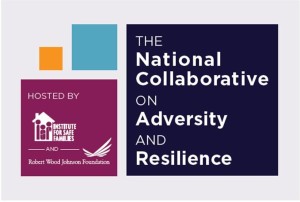 Last December, TLPI joined leaders convened by the Robert Wood Johnson Foundation, to discuss ways to expand national awareness of Adverse Childhood Experiences (ACEs) and methods to promote prevention and healing. Everyone is encouraged to read this important report from the Proceedings of the National Collaborative on Adversity and Resilience (NCAR). Below is an excerpt from the Executive Summary of the Report.
Last December, TLPI joined leaders convened by the Robert Wood Johnson Foundation, to discuss ways to expand national awareness of Adverse Childhood Experiences (ACEs) and methods to promote prevention and healing. Everyone is encouraged to read this important report from the Proceedings of the National Collaborative on Adversity and Resilience (NCAR). Below is an excerpt from the Executive Summary of the Report.
In 1998, the Centers for Disease Control published a study showing that adverse childhood experiences (ACEs)—living with an alcoholic parent, for example, or suffering physical abuse—were both common and corrosive to long-term health. Since then, biomedical research has begun to illuminate exactly how such early trauma can last a lifetime, shaping the way children and adults learn, play and grow.
We know now that traumatic experiences leave tracks in the developing brain, flood the body with stress hormones, hike the risk of engaging in unhealthy behaviors and raise our vulnerability to a host of physical and mental ailments. Toxic stress creeps under our skin, compromising our immune systems and even changing the expression of our genes.
Emerging neuroscience has also yielded some good news: ACEs are not destiny. If the human brain can be hurt, it can also be healed. And it is up to all of us to aid in that healing, creating communities in which everyone can thrive.
In December 2013, thirty-five national leaders in ACEs research, policy and practice came together at the Robert Wood Johnson Foundation in Princeton, New Jersey, for a retreat co-hosted by the Institute for Safe Families. This group, the National Collaborative on Adversity and Resilience (NCAR), met to advance a call to action is¬sued at the National Summit on ACEs earlier that year.
Over the course of two days, through vigorous conversation, small-group work, panel discussions and thought-provoking presentations, NCAR participants clarified their mission: to fuel the collective impact of people and organizations committed to preventing childhood trauma and creating a just, healthy and resilient world.
That effort is already under way; from Walla Walla, Washington to Tarpon Springs, Florida, communities are changing the way they think about health and illness, human suffering and strength. Trauma-informed schools are noting a decline in suspension rates and violence; health clinics are weaving behavioral health, mindfulness and creative arts therapies into the delivery of primary care. People are learning to ask not “What’s wrong with you?” a question freighted with judgment, but “What happened to you?” a question that invites dialogue, reflection and healing.
NCAR participants cheered those successes while mapping out the next phase of a national movement on ACEs and resilience. The group agreed to be guided by principles including equity, inclusivity and a broad definition of wellness that encompasses physical, mental, emotional and spiritual well-being.
Read the full Proceedings of the National Collaborative on Adversity and Resilience.